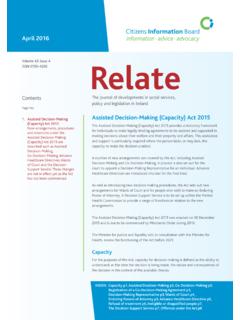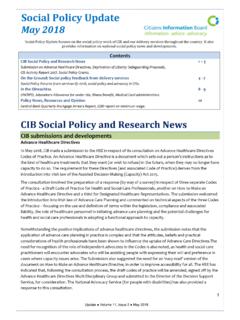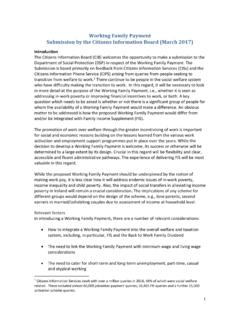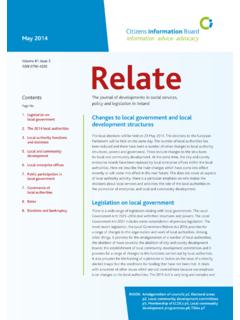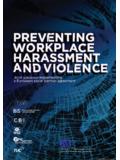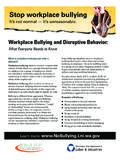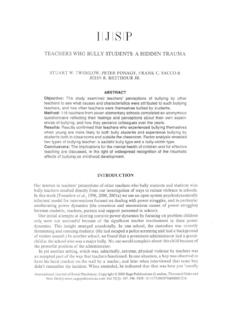Transcription of June 2015 Relate - Citizens Information Board
1 june 2015 . Volume 42: Issue 6. Relate ISSN 0790-4290. Contents The journal of developments in social services, policy and legislation in Ireland Page No. 1. Workplace Relations Act 2015 Workplace Relations Act 2015 . New arrangements, structures, processes and procedures are The Workplace Relations Act 2015 provides for a range of changes to the bodies being put in place for dealing with and procedures which deal with: industrial disputes and alleged breaches of employment laws. The resolution, mediation and adjudication of industrial disputes and 7.
2 Proposed employment The resolution of complaints about breaches of employment legislation legislation There are proposals for changes It provides for a new Workplace Relations Commission which will take over the to industrial relations law including collective bargaining functions of the National Employment Rights Authority, the Labour Relations and employment regulation Commission (LRC), some of the functions of the Employment Appeals Tribunal orders. (EAT) and the functions of the Director of the Equality Tribunal. The appeal functions of the EAT are being transferred to the Labour Court.
3 In effect, there will be two statutory bodies instead of the current four. The National Employment Rights Authority is not a statutory body. There will be one body the Workplace Relations Commission to which all industrial relations, employment law and employment equality disputes and complaints are referred. Appeals will be made to the Labour Court in all cases. Time limits for the making of appeals are being generally standardised. The Act also provides for a number of changes to a range of employment laws and for new compliance measures.
4 It amends 24 Acts and numerous Statutory Instruments. These amendments do not affect cases which are before a Rights Commissioner or the EAT when the Act comes into effect. The Act will be commenced on 1 October 2015 . Some administrative arrangements have already been put in place in advance of its implementation. For example, there is a central system for receiving complaints which are then referred to the appropriate body and some services are shared by the bodies concerned. INSIDE: Current arrangements p2, How complaints and appeals are dealt with p2, The new arrangements p3, Workplace Relations Commission p3, Dealing with complaints and disputes p4, General powers of the WRC.
5 P6, Changes to specific laws p7, Proposed employment legislation p7, Registered employment agreements p7, Law on collective bargaining p8, National Minimum Wage (Low Pay Commission) Bill 2015 p8. page 2 Relate june 2015 Citizens Information Board Here we briefly describe the current arrangements for dealing Employment Appeals Tribunal (EAT). with employment disputes and the main changes that are The EAT is the statutory body that deals with disputes under being introduced by the Act. a range of employment laws including the laws dealing with redundancy, unfair dismissals, minimum notice, organisation of Current arrangements working time, and the laws dealing with various types of leave.
6 The following is a brief summary of the current arrangements for dealing with industrial relations and employment Equality Tribunal The Equality Tribunal investigates complaints in relation law disputes. Further Information is available at: to equal treatment in employment under the Employment Equality Acts 1998 to 2011 and in relation to goods and services under the Equal Status Acts 2000 to 2012. It employs National Employment Rights Authority (NERA). equality officers and equality mediation officers. NERA was set up on an administrative basis in 2007.
7 It aims to ensure compliance with employment rights legislation. It employs inspectors and authorised officers who have powers Labour Court The Labour Court provides a service for the resolution of under various employment laws to carry out workplace industrial relations disputes. It establishes Joint Labour inspections to ensure compliance with the relevant law. Committees and registers Joint Industrial Councils. Employers are given a time period within which to rectify any breaches. If necessary, employers who are in breach of the It also makes legally-binding determinations under legislation may be prosecuted.
8 Employment laws such as those dealing with equality, pensions, organisation of working time, national minimum NERA has a specific role in relation to monitoring the wage, part-time work, fixed-term work, and safety, health and implementation of the Protection of Young Persons welfare at work. (Employment) Act 1996. Under the Act, it may grant licences to employers to employ young people in cultural, artistic, sports or advertising work. How complaints and appeals are dealt with The different employment laws have different arrangements It has a role in enforcement of awards made by the EAT and for processing complaints and appeals.
9 The following are the the Labour Court. main laws involved and the pathways for their complaints and appeals. It also provides an Information service on all aspects of employment laws. Rights Commissioner/EAT. You may complain to a Rights Commissioner about breaches Labour Relations Commission (LRC) of the following Acts and, if not satisfied with the outcome, The LRC is mainly concerned with industrial relations disputes. appeal to the EAT: It has a general role in improving industrial relations. It issues codes of practice on various aspects of workplace relations; Adoptive Leave Acts 1995 and 2005.
10 For example, it has issued a code of practice on procedures Carer's Leave Act 2001. for addressing bullying in the workplace. It provides a range European Communities (Protection of Employees on of industrial relations services including a conciliation service Transfer of Undertakings) Regulations 2003. through conciliation officers (sometimes known as industrial Maternity Protection Acts 1994 and 2004. relations officers), a workplace mediation service and advisory Parental Leave Act 1998. and training services. It assists Joint Labour Committees and Payment of Wages Act 1991.
